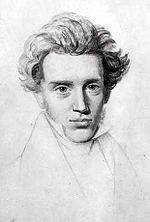- Concluding Unscientific Postscript to Philosophical Fragments
-
Concluding Unscientific Postscript to the Philosophical Fragments (Danish: Afsluttende uvidenskabelig Efterskrift til de philosophiske Smuler) is a major work by Søren Kierkegaard. The work is a poignant attack against Hegelianism, the philosophy of G. W. F. Hegel. The work is also famous for its dictum, Subjectivity is Truth. It was an attack on what Kierkegaard saw as Hegel's deterministic philosophy. Against Hegel's system, Kierkegaard is often interpreted as taking the side of metaphysical libertarianism or freewill, though it has been argued that an incompatibilist conception of free will is not essential to Kierkegaard's formulation of existentialism.
As the title suggests, the Postscript is sequel to the earlier Philosophical Fragments. The title of the work is ironic because the Postscript is almost five times larger than the Fragments. The Postscript credits "Johannes Climacus" as the author and Kierkegaard as its editor. Like his other pseudonymous works, the Postscript is not a reflection of Kierkegaard's own beliefs. However, unlike his other pseudonymous works, Kierkegaard attaches his name as editor to this work, showing the importance of the Postscript to Kierkegaard's overall authorship.
Contrasts in Concluding Unscientific Postscript
Objectivity Subjectivity Objective truth is that which relates to propositions, that which has no relation to the existence of the knower. History, science, and speculative philosophy all deal with objective knowledge. According to Climacus, all objective knowledge is subject to doubt. Focuses on what is asserted. Subjective truth is essential or ethico-religious truth. It is not composed of propositions or perceptions of the external world, but of introspection, experiences, and especially one's relationship with God. Direct Communication consists of statements that can be communicated and understood without appropriation, that is, without experiencing personally what is being communicated. Objective knowledge can be communicated directly. Indirect Communication requires appropriation on the part of the receiver. The receiver must experience or have experienced what is being communicated, not just hear it. External links
Søren Kierkegaard 1843–1846 On the Concept of Irony with Continual Reference to Socrates · Either/Or · Two Upbuilding Discourses, 1843 · Repetition · Three Upbuilding Discourses · Fear and Trembling · Four Upbuilding Discourses, 1843 · Two Upbuilding Discourses, 1844 · Three Upbuilding Discourses, 1844 · Philosophical Fragments · The Concept of Anxiety · Prefaces · Four Upbuilding Discourses, 1844 · Three Discourses on Imagined Occasions · Stages on Life's Way · Concluding Unscientific Postscript to Philosophical Fragments · Two Ages: A Literary Review

1847–1854 Edifying Discourses in Diverse Spirits · Works of Love · Christian Discourses · The Crisis and a Crisis in the Life of an Actress · The Lily of the Field and the Bird of the Air · The Sickness Unto Death · Three Discourses at the Communion on Fridays · Practice in Christianity · Two Discourses at the Communion on Fridays · The Book on Adler · For Self-Examination · Attack Upon Christendom
Posthumous publications Ideas Philosophy · Theology · Angst · Anguish · Authenticity · Double-mindedness · Indirect communication · Infinite qualitative distinction · Knight of faith · Leap of faith · Ressentiment · Rotation method
Related topics Categories:- 1846 books
- Books by Søren Kierkegaard
- Epistemology literature
- Metaphysics literature
- Philosophy of religion literature
- Works published under a pseudonym
- Philosophy book stubs
Wikimedia Foundation. 2010.
